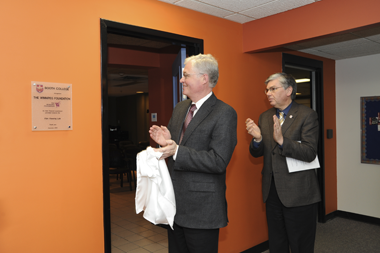 The Salvation Army's Booth College in Winnipeg was the site of a special unveiling of plaques recognizing the contribution of The Winnipeg Foundation to projects worth almost $98,000 that enhance the ability of the College to make a difference in the lives of its students and the community.
The Salvation Army's Booth College in Winnipeg was the site of a special unveiling of plaques recognizing the contribution of The Winnipeg Foundation to projects worth almost $98,000 that enhance the ability of the College to make a difference in the lives of its students and the community.
Dr. Donald Burke, President of Booth College welcomed Richard Frost, CEO of The Winnipeg Foundation, to campus to open officially the new film viewing lab and the social work interaction lab. The film viewing lab, with a seating capacity of 20, supports the College's new English and Film Studies program by providing state-of-the-art viewing facilities that will be used by students to examine the impact of film upon contemporary culture and to study film adaptations of classic literature. As part of the official opening, students Megan Bartel and Rebecka Lindgren shared an audio-video interpretation of Shakespeare's Hamlet.
The social work interaction lab provides the College's highly-regarded Bachelor of Social Work program with dedicated facilities to support the development of students' counseling skills. Professor Bonnie Bryant, Head of the Social Work program, described the profound difference that the new interaction lab will make to the skill development of students. As a program whose success is measured in part by its 100% job placement rate of graduates, the Bachelor of Social Work curriculum prepares students to be agents of transformation in our communities.
The grant from The Winnipeg Foundation also provided funds to install “Smart” technology in every classroom on campus. This new technology, complete with interactive screens that display web pages, videos and presentations, allows for the manipulation of data in ways that engage students. Faculty and students view the introduction of “Smart” technology as a significant enhancement to their teaching and learning environment.
In his remarks, Dr. Burke expressed the gratitude of Booth College to The Winnipeg Foundation for its support of these enhancements to the College's ability to offer strong programs to its students. Mr. Frost, who leads Canada's oldest and second largest community foundation, offered his congratulations to Booth College. He reminded those in attendance that this latest grant was neither the first nor likely to be the last that The Winnipeg Foundation will make to Booth College.
As a Christian university college operated by The Salvation Army, Booth College contributes to the achievement of the mission of the Army through the creation of innovative educational programs that prepare its students to bring hope, justice and mercy into our world. These latest enhancements are part of a plan to grow Booth College's student population to 600 over the next decade.
Photo: Rick Frost, CEO of The Winnipeg Foundation, along with Booth College President, Dr. Donald Burke, at the unveiling of a plaque of donor recognition at the official opening of the film viewing lab at the College. A recent grant of over $98,000 provided 'smart' technology and other projects throughout the College.
The word empathy has become contentious, particularly in some Christian circles.
A Lenten Pathway to Right Relationships
Walking softly with the United Nations Declaration on the Rights of Indigenous Peoples.
by Captain Crystal Porter FeaturesIn this Lenten season, we invite you to join us as we reflect on the wisdom of Scripture, listen to the voices of Indigenous Peoples and practise lament, using a new resource created by the territorial Indigenous ministries department: “Walking Softly With the Declaration: A Lenten Pathway to Right Relationships.”
Treasures of Darkness
When my son died, grieving became a sacred journey.
by Brenda Laidlaw FeaturesMy passionate prayers to God for my son’s physical healing ended abruptly the night he died. But my prayers of surrender are ongoing. My need of grace for this never ends. However, it was “bending my knee” that led me into the next step of kingdom grieving—that of healing.









Leave a Comment